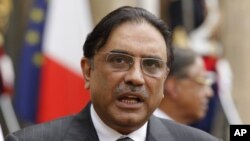NATO has invited Pakistani President Asif Ali Zardari to the alliance's summit in Chicago, a day after the country's prime minister proposed reopening ground supply routes to international troops in Afghanistan.
Zardari's spokesman said the president was considering the invitation, which he described as "unconditional" and not linked to the opening of supply lines "or to any other issue."
Islamabad closed the supply routes to NATO nearly six months ago to protest U.S. airstrikes that mistakenly killed 24 Pakistani troops near the Afghan border.
On Monday, Pakistan's prime minister, Yousuf Raza Gilani, said his government was in serious discussions with U.S. officials on reopening the supply routes. He led a meeting of military and civilian leaders late Tuesday to discuss the reopening.
U.S. State Department spokeswoman Victoria Nuland told reporters in Washington that Afghanistan's neighbor, Pakistan, has an important role to play in supporting Afghan security. She also said U.S. officials are "making progress" in reaching a deal with Pakistan on the reopening of the supply routes and would "work on it as long as it takes."
Next week's NATO summit will focus on the international community's commitment to Afghanistan's future. Until the talk of reopening the supply lines, it had been unclear if Pakistan would participate in the summit.
Pakistani officials demanded an unconditional apology for the deadly NATO airstrikes. But Washington only offered condolences and Islamabad retaliated by cutting off NATO ground supply routes. The U.S. withdrew as much as $3 billion of promised military aid, as relations with Pakistan deteriorated.
The attack also prompted Pakistan's parliament to review its future engagement with the United States, with lawmakers calling for an end to U.S. drone strikes on Pakistani soil. Washington says the strikes targeting militants in Pakistan's northwest are crucial to defeating al-Qaida and the Taliban.
Zardari's spokesman said the president was considering the invitation, which he described as "unconditional" and not linked to the opening of supply lines "or to any other issue."
Islamabad closed the supply routes to NATO nearly six months ago to protest U.S. airstrikes that mistakenly killed 24 Pakistani troops near the Afghan border.
On Monday, Pakistan's prime minister, Yousuf Raza Gilani, said his government was in serious discussions with U.S. officials on reopening the supply routes. He led a meeting of military and civilian leaders late Tuesday to discuss the reopening.
U.S. State Department spokeswoman Victoria Nuland told reporters in Washington that Afghanistan's neighbor, Pakistan, has an important role to play in supporting Afghan security. She also said U.S. officials are "making progress" in reaching a deal with Pakistan on the reopening of the supply routes and would "work on it as long as it takes."
Next week's NATO summit will focus on the international community's commitment to Afghanistan's future. Until the talk of reopening the supply lines, it had been unclear if Pakistan would participate in the summit.
Pakistani officials demanded an unconditional apology for the deadly NATO airstrikes. But Washington only offered condolences and Islamabad retaliated by cutting off NATO ground supply routes. The U.S. withdrew as much as $3 billion of promised military aid, as relations with Pakistan deteriorated.
The attack also prompted Pakistan's parliament to review its future engagement with the United States, with lawmakers calling for an end to U.S. drone strikes on Pakistani soil. Washington says the strikes targeting militants in Pakistan's northwest are crucial to defeating al-Qaida and the Taliban.





